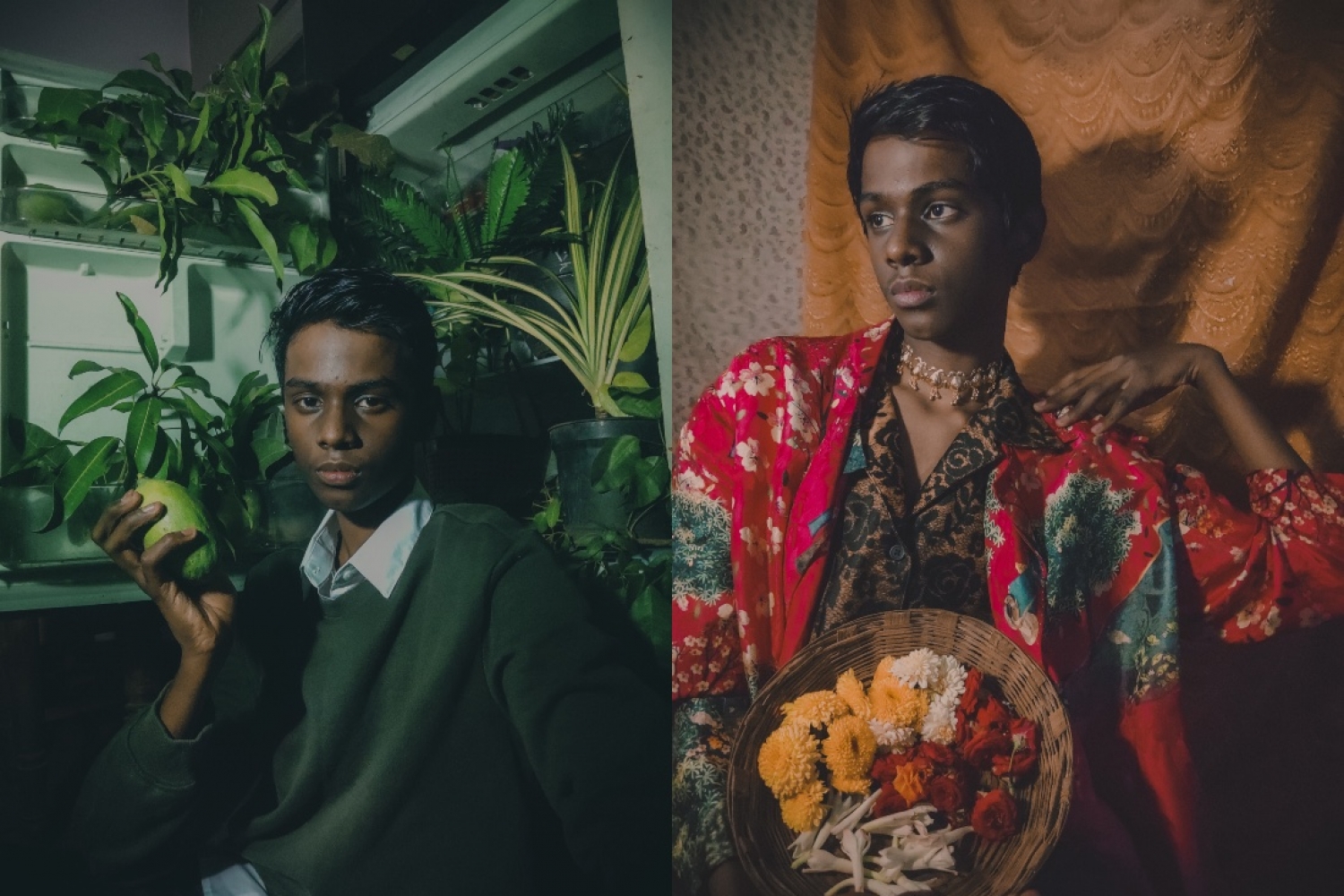

On the brink of turning 17, self-portrait photographer Sriram is often found armed with just the lens of his camera phone and some experimental lighting. Living in the metropolis of Bangalore, he is intent on breaking stereotypes through his works. He has always been interested in design, he tells me, and wishes to rebrand and recreate the world of fashion to be more inclusive. Having had a brief rendezvous with photography in middle school, his interest in the field only piqued last year, locked up in his house. And what began as a mere lockdown hobby, inspired by other creators, has taken Sriram on a path of self love, exploration and acceptance.
The medium of photography has always been interesting, for the way the camera looks at people insists on memorialising time. The evolution of the camera has led us down the path of selfies, which are also self-portraits of a kind. Exploring his relationship with the camera in the safe space of his home, Sriram says, ‘I’ve never been comfortable modelling in public. So self-portraiture is a way of experimenting by yourself. This whole editorial and studio vibe I create in my works is different, exciting and fun. I also feel like you can express a lot more through self-portraits. It gives you a lot of confidence. If I take pictures outside, people invariably stare and pass comments. I don’t bother to listen to it anymore though, I’ve become so confident and strong to even ignore hate comments and trolls.’
His creative process is heavily inspired by what he sees on Pinterest, adding his twist to each frame in his own style. ‘If I have a shot in mind, my first step is to explore. If I go out and see, let’s say some pipes, my mind automatically starts racing and trying to think about how I can use them. Then I look at the colour combinations. For example, if I have a pink background, I’d like for the foreground to be green,’ he tells me excitedly. Sriram’s use of colour evokes a style which is rustic yet chic. Using ordinary spaces and objects in his frames, he adds vivacity to his environ. Through his works, he also aims to subvert codified norms of being. ‘When I started doing self-portraits, I didn’t see a lot of guys doing it. It’s something rare and interesting. Also, there are a lot of stereotype poses when it comes to modelling. But I didn’t follow them at all. I want to break stereotypes of what boys and girls should do. Now, I perceive the society without gender. I want people to embrace that,’ he asserts.
Self-portraits are also closely linked to identity. Speaking of his relationship vis-a-vis photography, identity and acceptance, he tells me, ‘I have been bullied because of my skin colour since the fourth grade, because of which I felt very discouraged. I never looked at myself and said “oh my eyes are beautiful”. So self-portraits have really helped with accepting myself. I now think that I look good. My skin colour is very rare and the complexion is beautiful. It has taught me to embrace myself. Everybody has certain qualities and we just need to recognise them. I’ve evolved into a new person. And I want this to be a platform for people who have a different skin colour. I don’t want them to get discouraged. I want them to embrace it.”
Photography’s significance has been unparalleled in Sriram’s life. He opens up to me about his feelings of loneliness in the absence of a stable friend group. Self-portraits, in such a scenario, became his tool of empowerment. Sriram’s resilience, as he navigates the high school experience, is commendable. His spirit has never been defeated. And his perception of the world has maturely evolved as a content creator. ‘I do feel special about doing self-portraits because it has given me so much. Not every person is going to earn at this age through this medium,’ he says. He recently collaborated with No Borders, a sustainable marketplace that brings together diversity in fashion, culture and art. Initially, when approached by them, Sriram was a tad skeptical for he thought it was different than his boho and colourful style. ‘This one was more of a grunge look. So it was definitely out of my comfort zone. But the clothes were very nice, and the fact that they’re all sustainable was very important to me. This is a new alternative to the fast-fashion of H&M and Zara. I got to wear clothes from all over the world, like Sri Lanka and Pakistan.’
Sriram is not afraid to redefine constructs of gender and society. Even in his shoot for No Borders, he chose to adorn himself with jewellery, in an attempt to break conventions and normalise the versatility of fashion. To that end, he is currently working on shooting with a jewellery label. His hope for the future is to work with diverse brands, explore and experiment with different kinds of clothing. Saving up to buy a camera, he hopes to better his reach. On a parting note, he says, ‘I want talent, whoever’s it is, to be recognised and appreciated for talent. I believe in organic growth because I know my talent speaks.’
Text Devyani Verma
Date 18-08-2021